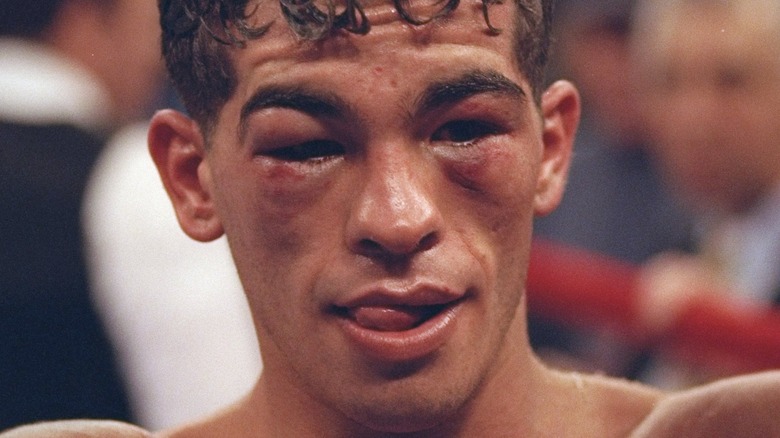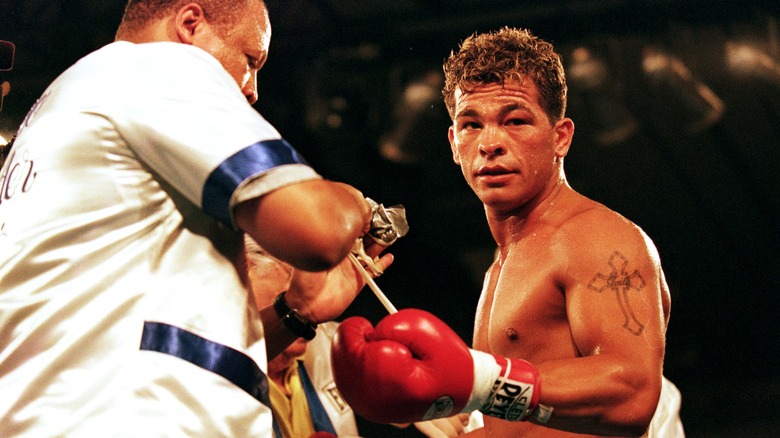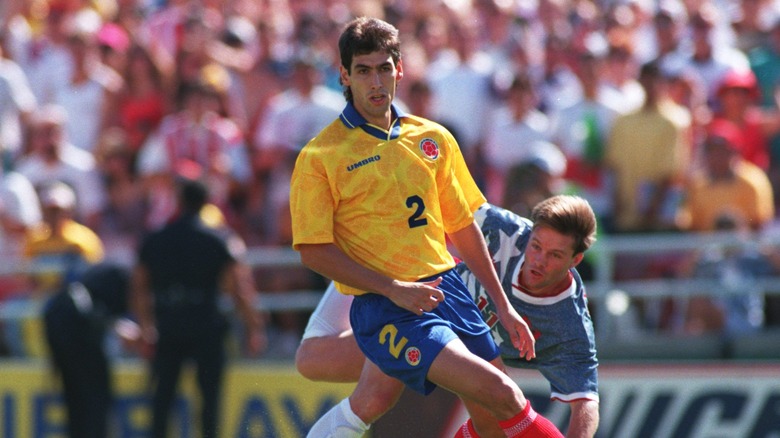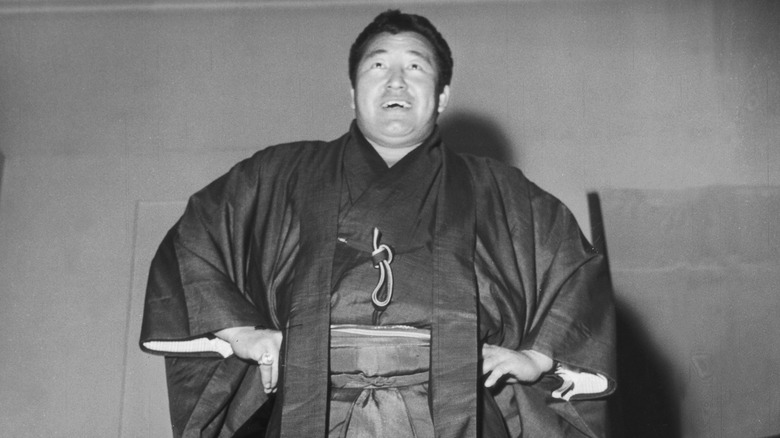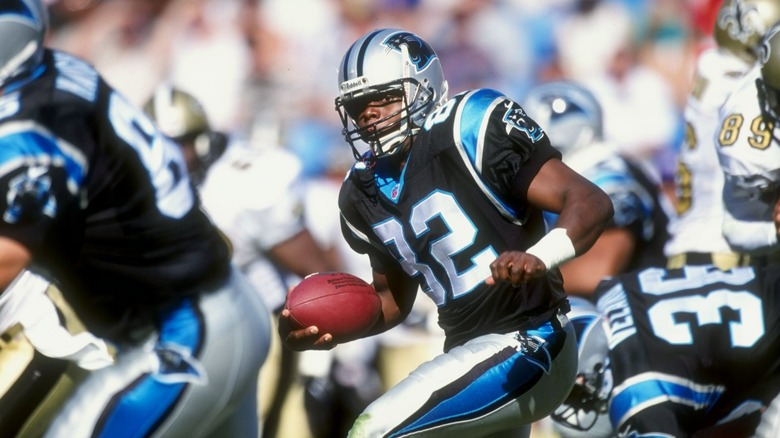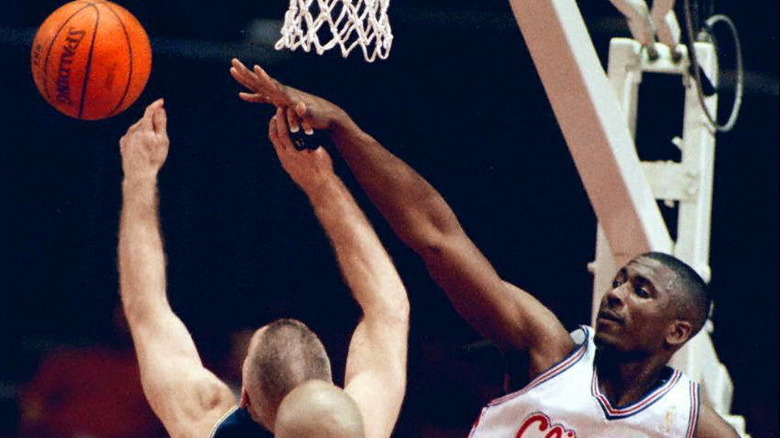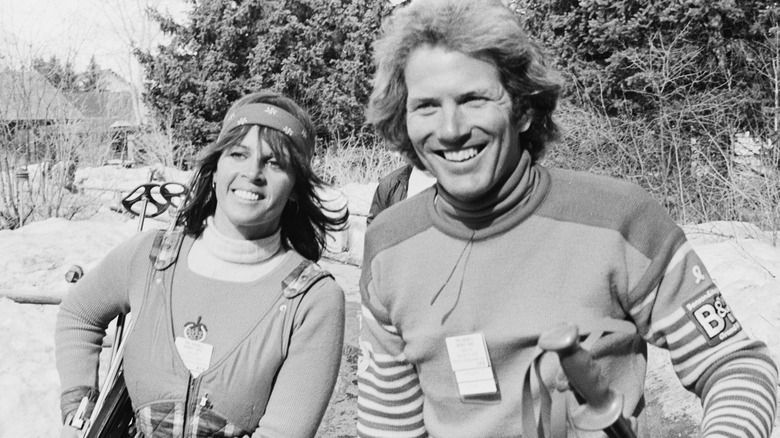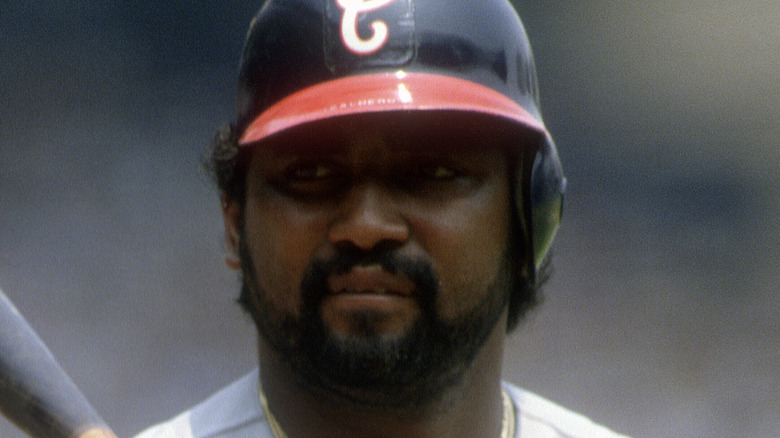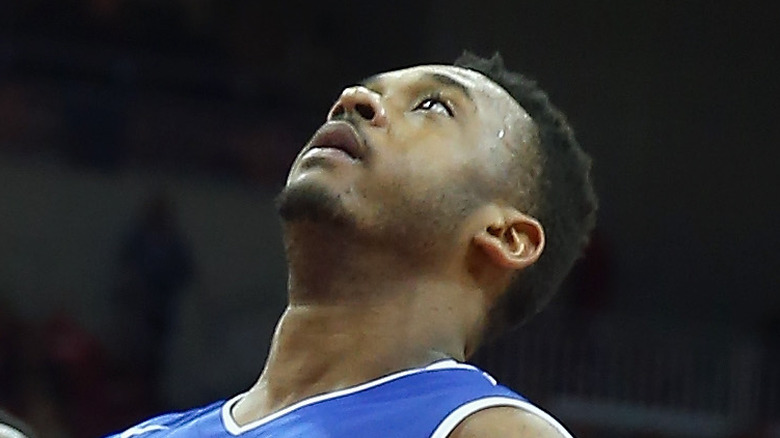Athletes Who Died Under Suspicious Circumstances
Professional athletes are a fascinating breed, combining movie star-like charisma with supreme talents and gifts of a physical nature that make them seem almost superhuman. They've worked and willed themselves into the highest echelon of sports, so dazzling to the rest of us that when they die, it's somewhat baffling. They had behaved like immortals and were treated accordingly; their deaths are a stark reminder that even though athletes accomplish the rarest and most difficult things of which a human being is capable, they're still flawed and imperfect human beings nonetheless, and people don't live forever.
It's hard to pinpoint any one reason — perhaps it's the most logical end to a high-profile, high-pressure, high-stakes life — but many athletes have died in a particularly grisly, tragic, or unsettling circumstances. All those weird feelings triggered by death are ramped up even more when the manner of that death leaves a lot of unanswered questions. Here's a list of some of the strangest sports deaths that left the public puzzled.
Pat Tillman
For four NFL seasons, Pat Tillman was a solid and reliable defensive back for the Arizona Cardinals. But then the terrorist attacks of 9/11 happened, and in the wave of collective pain and patriotism that swept the nation, Tillman felt a calling and quit his lucrative and cushy career as a professional football player (per the San Francisco Chronicle) to join the Army with his brother, Kevin, who similarly walked away from a professional baseball contract. The two became Army Rangers, graduating from one of the most elite military training programs on Earth.
Tillman was held up as an inspiration and a symbol of selfless American pride, and then, just two years after enlisting, he died at the age of 27 while serving in Afghanistan. According to initial reports (via Biography), Tillman was killed in combat. Years later, the truth would emerge: Tillman died in the line of duty, but he wasn't struck down by an enemy's bullet — his death was the result of a "friendly fire" mishap.
Arturo Gatti
Arturo Gatti was a juggernaut. Across the span of his 16-year boxing career, he went 40 and 9 in two weight classes, accomplishing more than three quarters of his wins by knockout. He slowed down for a while, eventually attempting a comeback in 2007 where he lost by TKO. After that, he said he was done with fighting. And just two years later, he was gone.
According to the New York Daily News, the body of 37-year-old Gatti was found in his room at a Brazilian resort in July 2009. The boxer was discovered hanged, and postmortem tests would indicate moderate amounts of alcohol and muscle relaxants in his system, per the CBC. Initially, Gatti's wife, Amanda Rodrigues, was charged with murder, primarily owing to a bloodstain on her purse, and partly because police didn't buy her explanation that she'd been in the same room with Gatti for 10 hours and didn't know he was dead. Lacking enough crucial evidence, police released Rodrigues, and Gatti's cause of death was officially changed from homicide to suicide, according to the CBC. Private investigators have since challenged that conclusion, and a separate investigation by a Quebec coroner failed to produce definitive answers.
If you or anyone you know is having suicidal thoughts, please call the National Suicide Prevention Lifeline at 1-800-273-TALK (8255).
Andres Escobar
According to The Sun, Colombia is a powerhouse in world soccer, and prognosticators, among them the great Pelé, predicted the men's national team would sail through the 1994 World Cup. Instead, the squad unexpectedly melted down early and was knocked out of the tournament in the initial group stage, according to FourFourTwo. One of those losses was to the largely unheralded U.S. team, who defeated Colombia 2 to 1 thanks in large part to an "own goal" by Colombian defender Andrés Escobar, who committed the rare and embarrassing act of sending the ball into his own team's net.
Escobar subsequently flew home to Medellin, Colombia, and after leaving a nightclub one night about a week after that own-goal game, he was shot and killed. The official account of his death, according to a Colombian court: He'd talked to a spoken-for woman in the club, two men confronted him about it (and some offensive ads he'd appeared in), and as the three fought, the aggressors' driver shot the soccer star. Rumors persist, however, that Escobar's death was tied to the voluminous and cutthroat Colombian drug trade of the early 1990s, which was centered in Medellin. Reportedly, drug cartels had huge bets on Colombia's success in the World Cup, and Escobar's blunder had cost them a fortune. That's a theory supported by witnesses who claim to have heard the gunman shout "Goal!" each time he fired at Escobar.
Rikidōzan
Born in Korea in 1924, Kim Sin-rak would eventually be known as "The Father of Puroresu," or Japanese professional wrestling (per Pro Wrestling Stories) because of his accomplishments in the ring under the name Rikidōzan, or roughly "rugged mountain road." According to Fox Sports, he helped popularize highly theatrical American-style pro wrestling in Japan.
One evening in December 1963, Rikidōzan went out drinking at the New Latin Quarter Club in Tokyo. There are conflicting accounts of what happened, but according to an official report, Rikidōzan had been speaking with a woman near the men's room when Yakuza criminal organization affiliate Katsushi Murata grazed the wrestler as he walked by. Rikidōzan didn't see it that way, claiming that Murata had stepped on his foot. Murata tried to de-escalate, but the intoxicated Rikidōzan responded with violence, attacking and repeatedly striking the other man. Murata, who a year earlier had gotten in a fight with another wrestler and nearly died from his injuries, didn't hesitate to take out a large knife and stab Rikidōzan in his abdomen until his pummeling stopped. Rather than go to a hospital and arouse attention, Rikidōzan quietly checked into an obstetrics hospital, where doctors diagnosed four piercing wounds in the wrestler's intestine. Rikidōzan had surgery and was expected to make a full recovery, but he didn't. On December 15, 1963, the stab wound led to internal hemorrhage and peritonitis, killing Rikidōzan at age 39.
Fred Lane
It's not a question of how Fred Lane died, but why. Lane was a star running back for the NFL's Carolina Panthers from 1997 to 1999 and was traded to the Indianapolis Colts in advance of the 2000 season. He'd never suit up for his new team, however. According to ESPN, on July 6, 2000, Lane entered his home in North Carolina, where his wife, Deidra Lane, immediately shot him as he came through the door, and then once more in the back of the head. Deidra Lane told a 911 operator afterward, "He just got shot because he wouldn't leave me alone," echoing a domestic complaint she'd filed earlier in the year against her husband.
At Deidra Lane's trial, defense attorneys characterized Fred Lane as a chronic spousal abuser, and maintained that Deidra acted in self-defense. The prosecution argued murder — that Deidra Lane killed her husband for a life-insurance payout, and that an ambush-style shooting, with a shot delivered to the back of the head, didn't look like self-defense. Deidra Lane wound up entering a guilty plea to a charge of voluntary manslaughter and served just under six years in prison.
Lorenzen Wright
In his 13-year career, Lorenzen Wright bounced around the NBA, playing for the Los Angeles Clippers, Atlanta Hawks, and Memphis Grizzlies, among others. In July 2010, about a year after he played his final NBA game, Wright mysteriously disappeared. According to his former wife (via CBS News), Sherra Wright, the athlete left her Memphis home late on the evening of July 18, 2010, with a large amount of cash. She said she had overheard him tell someone on the phone he planned to "flip something for $110,000."
According to USA Today, 10 days later, the body of 34-year-old Lorenzen Wright was found in a wooded, remote area, located by pinging his cell phone from a 911 call he made the night of his disappearance. An autopsy showed that Wright had been shot five times. The case remained shrouded in mystery for years, but in 2017, police arrested Wright and a church friend, Billy Ray Turner, on murder charges. In 2019, Wright pleaded guilty to the facilitation of first-degree murder. In 2022, Turner was found guilty of first-degree murder, attempted first-degree murder, and conspiracy (via CNN).
Greg Halman
By age 24, Dutch baseball player Greg Halman had played for the Netherlands' national team and made it to the American big leagues, playing as an outfielder for the Seattle Mariners in 2010 and 2011. Then, on a trip back home to the Netherlands in November 2011, he was stabbed to death in his apartment in Rotterdam by his roommate and brother, Jason, according to Dutch newspaper De Telegraaf (via Deadspin).
Charged with murder, Jason Halman's lawyer pleaded an insanity defense. Prosecutors and the court itself accepted the assessment of court-appointed psychiatrists who believed the defendant to be in a state of temporary psychosis brought on by the use of marijuana. According to Dutch News (per MLB), he was released from prison in August 2012, agreeing to enter counseling and report to a probation officer. Halman's parents — mother and father of the victim and the accused — agreed with the verdict and had pushed for it. "It is for the prosecutor an extraordinarily difficult position," attorney Fritz Huizenga said. "He finds himself in the dilemma that there is a serious crime was committed, but that perpetrators and victims are on the same side. The family of Gregory, the victim, wants nothing more than Jason to be released, in order not to lose two sons."
Vladimir Spider Sabich
Spider Sabich was a talented skier, a member of the U.S. national team, a competitor in alpine, giant slalom, and slalom events at the 1968 Winter Olympics, and then a top performer and earner on the professional circuit in the early 1970s before a back injury cut his career short. Sabich dated singer and actor Claudine Longet throughout the 1970s, and on March 21, 1976, he was showing her his pistol in their Colorado home when it discharged accidentally, shooting him in the stomach and leading to his death, according to Skiing Heritage Journal. That's Longet's account of the tragic day, but police uncovered clues that suggested Sabich's death was the result of more complicated circumstances. Longet had a significant amount of cocaine in her bloodstream at the time, and diary entries contradicted her claim that the romantic relationship was solid. Additionally, the gun in question had a defect that required the trigger to be pulled several times in order for it to fire. In other words, it would have been quite difficult for it to accidentally discharge.
A lot of that evidence was deemed inadmissible due to poor police management — they'd acquired Longet's potentially incriminating diary and blood sample without the proper paperwork. Longet ended up serving 30 days in prison, mostly on weekends, on criminal negligence charges.
Len Koenecke
After a mediocre rookie season with the New York Giants, Len Koenecke offensively exploded for the Brooklyn Dodgers in 1934, racking up 147 hits, 14 home runs, and a .320 batting average. But the next year, Koenecke's stats fell off considerably (92 hits with a .283 average in 100 games), and the Dodgers parted ways with the player and sent him home in the middle of a road trip in September 1935, according to SABR.
Koenecke was reportedly visibly intoxicated and had a bottle of whiskey in his hand when he got on a plane in St. Louis. During the trip, he grew agitated and quarreled with other passengers, and when a flight attendant tried to stop him from physically fighting someone, Koenecke knocked her to the floor. He was restrained and guarded for the remainder of the flight, then released into the Detroit airport, where he took an hours-long nap.
When he awakened, Koenecke chartered a flight to Buffalo. During this excursion, Koenecke attempted to hijack the plane but was stopped by the pilot, who bludgeoned his attacker to death with a fire extinguisher, according to the Spokane Daily Chronicle. Pilots William Mulqueeney and Irwin Davis were charged with manslaughter in the death of 31-year-old Koenecke. According to the Toronto Star, charges were dropped after a brief investigation concluded the men had killed Koenecke in self-defense.
Ivan Calderon
Ivan Calderon played Major League Baseball for 10 seasons across the 1980s and 1990s, playing outfield for the Seattle Mariners, Chicago White Sox, Boston Red Sox, and Montreal Expos. An all-star selection in 1991, Calderon hit .272 with 104 home runs and 444 runs batted in before he retired in 1993.
After his playing days ended, Calderon moved back to his birthplace of Puerto Rico and lived in the northern city of Loiza, which is where he was shot and killed in December 2003 (via ESPN). According to police, Calderon was in the El Trompo bar when two men silently entered, approached the former baseball star, and shot him. According to the Chicago Tribune, Calderon's death was a revenge killing for a different murder allegedly committed by his son. Police were led to believe that members of a drug-running Puerto Rican gang had told Calderon to reveal the whereabouts of his 18-year-old son, who they thought killed one of their members. If he didn't comply and allow his son to be murdered, Calderon himself would pay with his life. As of 2022, the crime remains unsolved.
Zeke Upshaw
A promising basketball player and a rising star in sub-NBA channels, Zeke Upshaw played college ball for two major programs — Illinois State and Hofstra University — before turning professional and joining leagues in Slovenia and Luxembourg (via ESPN). In 2016, he returned to the United States and declared himself eligible for the G League draft, where the Detroit Pistons affiliate Grand Rapids Drive picked him up in the fourth round with plans to develop his talent until he was ready for the NBA.
That big-time debut would never arrive. According to The New York Times, Upshaw collapsed mid-play toward the conclusion of a game in Grand Rapids in March 2018. Two days later, he died at an area hospital at the age of 26. Upshaw's mother, Jewel Upshaw, filed a wrongful death lawsuit with the NBA, Detroit Pistons, and the companies that operate the Grand Rapids Drive. The suit alleged that medical staff hadn't been properly trained and, as a result, hadn't recognized or properly treated Upshaw's cardiac arrest, which led to his death. Video of the collapse shows that nearly a minute passes before anyone recognizes the emergency, and a heart issue was not detected in two preseason physicals by the Drive. The suit was settled for an undisclosed sum in 2019.
Erica Blasberg
Erica Blasberg was a standout on the amateur, college, and professional circuits of golf. According to the USGA, she was a quarterfinalist in the 2000 U.S. Girls' Junior tournament and a two-time All-American. Following a spot on the U.S.'s Curtis Cup squad, Blasberg joined the Ladies Professional Golf Association (LPGA). In May 2010, the 25-year-old athlete was found dead at her home in Henderson, Nevada, with no immediate signs of trauma, struggle, or illness upon which to blame the untimely death (via ABC News). About a month later, per ABC News, the Clark Country, Nevada coroner's office ruled the cause of death to be suicide. Blasberg had fatal levels of prescription-grade cough, pain, anti-anxiety, and headache medicines in her system at the time of her death, and she asphyxiated.
While the coroner's report indicated a lack of murderous intent, area police still issued an arrest warrant for Dr. Thomas Hess. He reportedly spoke with Blasberg the evening before her death, and on the day her remains were found, Hess called 911 from the golfer's home. A prescription written by Hess was found amongst Blasberg's effects, but she hadn't been seeing him for medical treatment. Police filed charges of obstruction of justice on account of how they believed he tampered with the crime scene — Blasberg's home — before police could investigate the death. Per ESPN, Hess pled guilty to that charge and later faced a wrongful death lawsuit from the golfer's parents.
If you or anyone you know is having suicidal thoughts, please call the National Suicide Prevention Lifeline at 1-800-273-TALK (8255).
